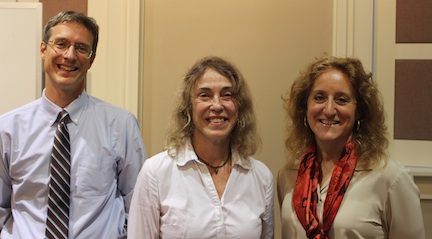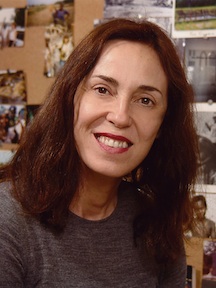By Allen Brewer
The Beta of Mississippi Chapter at the University of Mississippi was honored to host ΦBK Visiting Scholar Judith Carney, Professor of Geography from the University of California, Los Angeles.
Since 1956, the ΦBK Visiting Scholar Program has been offering undergraduates the opportunity to spend time with some of America’s most distinguished scholars. The program contributes to the intellectual life of the campus by making possible an exchange of ideas between the Visiting Scholars and the resident faculty and students. As part of her visit to UM, Carney spent two days on campus taking full part in the academic life of the university. She met informally with students and faculty members, participated in classroom discussions and seminars, and gave a public lecture open to the academic community and the general public.
Carney is the author of two award-winning books: Black Rice: The African Origins of Rice Cultivation in the Americas (Harvard University Press, 2001) and In the Shadow of Slavery: Africa’s Botanical Legacy in the Atlantic World (University of California Press, 2010). Her scholarly work focuses on the use of mangrove ecosystems in West Africa and the diaspora, the historical significance of recent genetic sequencing of African rice, and African foodways in the Americas.
In her public lecture at UM on September 14, Carney discussed the lasting effects slavery had on agriculture and food preparation in American culture.
Using information gathered from maps, paintings, genetic tests, and oral traditions, Carney revealed that many types of plants and animals were first cultivated and domesticated in Africa. Food crops such as yams, black-eyed peas, and many varieties of rice were traditionally grown by Africans centuries before the first European slave traders arrived. Millet, sorghum, plantains, and okra were also cultivated, providing yields plentiful enough to sustain the community. Animals like the hairless sheep, genie fowl, and different breeds of cattle were also genetically traced to their ancestral roots in Africa.
European travelers described the advanced horticultural practices of African rice farmers in their journals. During the time of the trans-Atlantic slave trade, local crops from Africa supplied the ships heading to the New World with food for the long voyage. In the 19th century color lithograph Top Deck of French Slave Ship, Carney pointed out what she believes to be women cooking on board as early evidence of African food preparation in slavery. Some traditional narratives describe a woman with grain in her hair, hiding it for her people. If excess food, such as grains or tubers, was available after the voyage ended, slaves could have planted these to grow new crops.
While slaves were forced to produce commercial crops for their masters, some plantations allotted slaves plots of land for their own gardens, providing a place to grow the native plants from Africa. Some foods, such as fried okra or black-eyed peas, may have been prepared by slaves for their masters to eat. As history goes, those crops have merged into American culture and are recognizable today, while other plants, like the kola nut, have been transformed into new products. In times past, the kola nut was used to freshen a ship’s stagnant water supply on long voyages but is now an ingredient in the popular soft drink Coke.
The lecture received a standing ovation from the crowd, and many questions were asked about Carney’s future research on the history of rice production by slaves. Before the public lecture, Carney met with several student groups on campus, including a biology class, to talk about her research on the uses of mangrove trees. Such trees can be used to buffer against hurricanes and provide homes for many marine animals. Carney was also able to meet with resident members of the chapter at UM and attend a lunch hosted by the honors college. When not attending an event, the scholar had the opportunity to tour the historic home of William Faulkner located in Oxford, Miss., near the UM campus.

L-R: UM Chapter President William Schenck, Visiting Scholar Judith Carney, and Chapter Vice President Sandra Spiroff.
Allen Brewer is a junior at the University of Mississippi majoring in journalism. The University of Mississippi is home to the Beta of Mississippi Chapter of Phi Beta Kappa.




